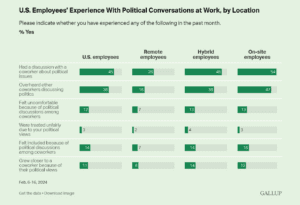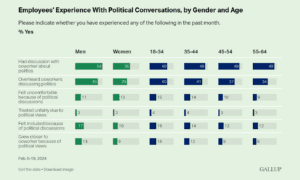Whether you love or loathe discussing politics on the job, it’s practically inevitable that these topics will come up at work. In our current political climate, navigating these conversations has become increasingly challenging for both managers and employees.
Talking politics at work isn’t just about heated debates in the break room—it impacts workplace culture, productivity, morale, and employee relationships. Without keeping a close eye on these discussions, the workplace can quickly become toxic.
That’s why leaders need practical strategies for navigating these discussions while maintaining a positive work environment.
So today, let’s explore how to handle the ethics of talking politics at work. We’ll examine current research and tips on workplace political discussions and provide actionable tips for managing political discourse in your organization.
The Current Landscape of Politics on the Job
Before diving into solutions, let’s examine what recent research tells us about discussing politics at work. These numbers and patterns may help you identify the best approaches to political discussions in your workplace.
Gallup’s report on politics at work offers insights into which demographics are more likely to discuss politics at work and the general sentiment surrounding these discussions.
On-Site Employees Are More Likely To Talk Politics
Unsurprisingly, on-site employees are much more likely to discuss politics on the job—54% of on-site employees reported talking about politics in the workplace in the past month, compared to 28% of remote workers.
Of course, employees who share physical spaces have more opportunities for casual conversations. Coffee breaks, lunch meetings, and other casual encounters make it easy to talk about politics at work.
It makes sense, then, that hybrid workers fall somewhere in between at 48%. So, the more in-office employees an organization has, the more likely political discourse is. Still, remote employees are having those conversations too.
Political Discussions Impact Workplace Productivity
Another report from Civic Science reveals that over half of U.S. workers express concern about how talking politics on the job will impact their daily experiences at work.
Even more striking is that more than half of workers have witnessed heated political discussions at work, and nearly 40% have participated in them. And 64% of leaders report having witnessed heated discussions.
The most significant stat is that over 60% of workers agree that talking about politics at work affects their productivity.
Engaged Employees Handle Political Discussions Better
It’s not all bad—an encouraging insight from Gallup’s report reveals that engaged employees are half as likely to feel uncomfortable during political discussions when compared to their disengaged peers.
Instead of feeling alienated, engaged employees report feeling included in these conversations.
So, if engaged employees are less bothered by politics at work, focusing on engaging your disengaged employees can help offset some of the negative effects of political talk in the office.
Demographics Matter in Political Workplace Conversations
The research from Gallup shows that men and older employees have more discussions about politics on the job. However, the report from Civic Science has some conflicting numbers:
- Age: The Gallup report found that older workers are more likely to engage in political discussions. Meanwhile, Civic Science found that younger workers between 18 and 24 are most concerned about discussing politics on the job.
- Political Party: Gallup found that conservative-leaning employees report having more political discussions at work. Civic Science adds nuance here, reporting that liberal-leaning staff have more concerns about talking politics at work.
Civic Science also reported that racial minorities express higher levels of concern about workplace political discussions; however, Gallup did not have statistics to compare.
Either way, it’s essential to create inclusive environments where all employees feel comfortable, regardless of their political views or demographic background. When you embrace all generations and demographics, you improve psychological safety.
No employee should feel unsafe when sharing their thoughts with their colleagues.
Finally, remember that the most outspoken voices aren’t always representative of the whole. Many employees don’t engage with politics at work at all, and others aren’t very political in general. Your workplace may be more politically diverse than you realize!
Can You Talk About Politics at Work? Understanding the Legal and Ethical Landscape
So, beyond the statistics, many managers wonder: Can you talk about politics at work from a legal and ethical standpoint? The answer is nuanced.
In the United States, the First Amendment protects political speech, which means that employees generally have the right to discuss political topics.
That said, research published via Science Direct raises ethical concerns. Specifically, this research found that employers sometimes use “ideologically-tinged rhetoric to justify workplace discrimination.”
This creates complex situations where political discussions can cross into discriminatory territory.
The key is to stay informed about political discussions so you can identify when they become problematic and then know how to address any issues appropriately.
Tips for Handling Political Discourse in the Office
It can feel like a lose-lose situation where there’s no right answer, but navigating politics at work is possible—it’s just a delicate balance.
People can get very passionate about politics. It’s something that is incredibly important to a lot of people, and they may become excited or heated when they talk about politics at work.
Whether or not you agree with someone, try to remember how important politics may be to them. Like religion, it’s something near and dear to many people. It’s essential to be respectful and mindful of your words, and to handle discussions with civility and grace.
Here are some proven strategies for navigating these challenging conversations.
Avoid Suppressing All Political Discourse
A common reaction to people talking politics at work is to ban all political discussions. While the intent is understandable, this approach can backfire for several reasons.
First, total suppression of political talk violates free speech principles. Under the First Amendment in the United States, you cannot suppress people’s freedom of speech, which means you cannot revoke an employee’s rights to discuss political topics.
Second, suppression tends to create unintended consequences. It can create rifts between management and employees who feel like their rights are being violated.
Those rifts build over time and can result in resentment and toxicity. While there are exceptions (which we’ll get to in a moment), employees need to be able to discuss things freely, and that includes politics.
The solution isn’t elimination—it’s management and guidance.

Watch for Toxicity and Discrimination
While you cannot suppress all political talk at work, some lines shouldn’t be crossed. The ethics of talking politics at work involve maintaining boundaries around discrimination, harassment, and toxicity.
Your business has a mission statement, core values, and beliefs that shouldn’t be compromised.
If your workplace emphasizes the importance of diversity and inclusion, for example, you can’t abandon those principles during political discussions. Especially not those involving topics such as gender and LGBTQIA+ rights.
This can be a fine line to walk. However, discrimination cannot be tolerated in the workplace, even in the context of political discussions.
Address Productivity Impact Head-On
Given that 60% of workers report that talking politics on the job can affect their productivity, leaders need to be proactive. Research shows that employees who feel cared for by their managers are more likely to acknowledge this impact on productivity.
Create clear expectations about when and where it’s appropriate to talk about politics in the workplace. Consider designating specific times and spaces where these conversations are allowed while protecting focused time and workplace productivity.
Emphasize Common Values & Goals
Though employees may disagree politically, they share common ground—your company’s goals, core values, and vision.
Emphasize how employees are working toward a shared goal and how everyone just wants what they believe is best. One effective way is through charity team building events, which can help employees see the bigger picture beyond politics.
Events such as Clean Water Connection and Operation Cancer Care can help employees come together to support those in need, which can often minimize fighting over politics.
Give Employees Productive Dialogue Tools
One of the most important things you can do is equip employees with the tools they need to have respectful political conversations. Having thoughtful discussions isn’t always easy, so make sure you provide support.
Employee trainings on de-escalation techniques and empathy skills can help them better understand and empathize with each other’s perspectives. These tools help them handle the tough conversations that arise when dealing with politics on the job.
These skills also benefit broader workplace communication and conflict resolution.
Create Safe Spaces for Difficult Conversations
Finally, instead of avoiding difficult conversations, create safe and structured opportunities for respectful dialogue. Without these outlets, negative feelings can fester, and people may develop resentments towards one another due to their differences.
There are many ways to approach this.
Some businesses establish a separate discussion space for politics, accompanied by clear guidelines. Others facilitate moderated discussions to help employees understand different perspectives.
Remember, the goal is understanding and respect. It’s nearly impossible to get everyone to agree with one another.
Emphasize Psychological Safety for All Political Perspectives
Creating psychological safety means ensuring that all employees feel comfortable and safe expressing their views in a respectful manner, regardless of their political affiliation. This is the most important aspect of facilitating the discussion of politics on the job.
To achieve this, you must make a deliberate effort to respect and embrace all generations, demographics, and political perspectives within your workplace.
Ensure that your employees understand the importance of this for your company culture and provide them with a safe space to discuss concerns if they believe these guidelines are being overlooked.
Consider implementing both an anonymous comment box and an open-door policy for those who need to report cases of discrimination, disrespect, or inappropriate political discussion.

Moving Forward: Politics in the Workplace as a Management Skill
Talking about politics on the job is unavoidable. Research shows that over half of workers are concerned about the impact that discussing politics at work can have, and yet these discussions continue happening in work environments.
Since those conversations can quickly become toxic, leaders need to step up. The solution is not avoiding the issue or hoping it’ll resolve itself, but improving management skills to better facilitate healthy discourse and understanding.
At TeamBonding, we’ve helped businesses navigate workplace conflict for decades. We have numerous team building events designed to promote understanding and help make difficult conversations more respectful and productive.
Talking politics on the job will always be challenging, but the right strategies and tools can help you create an environment where employees feel respected and valued regardless of their political beliefs.
Ready to help your employees understand each other better? Get in touch with us today to learn how TeamBonding can support your organization in facilitating healthy, respectful workplace dialogue, even when it’s about politics.
















